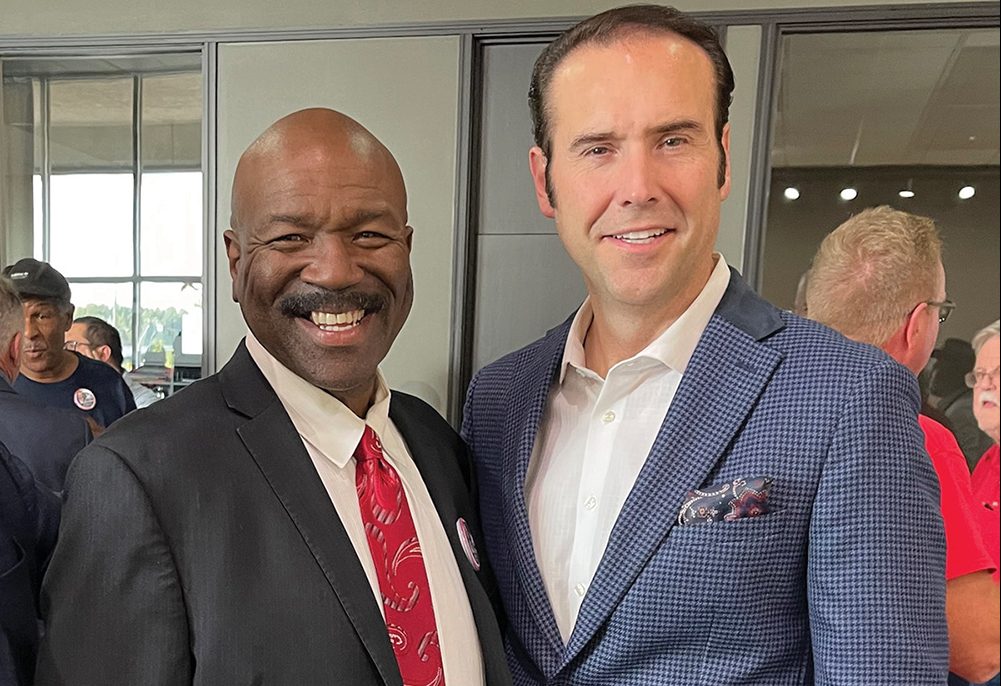Memphis Made Brewing Company has been in operation about 10 months and has introduced 16 styles of beer to the Memphis market. Two new IPAs are being introduced this month, including Guitar Attack in bottles and a Golden Ale especially for Gonerfest aptly named GBR. Their popular Lucid Kolsch is slated to be their first year-round offering.
When it comes to advising one on how to drink a beer, Memphis Made co-owner Andy Ashby puts it plainly: Hold glass, tilt, don’t choke. Brewmaster Drew Barton takes the question a bit more seriously. His first bit of advice? Don’t smoke. “It distracts from the flavors,” he says, adding, “Also, it’s so bad for you.”
Ashby, who has now put out his one cigarette of the day, says that temperature is also important for serving different styles of beer. “Ales, and we just brew ales, generally speaking, can go warmer than lagers,” he says. “The English drink their beer cool not cold. The mass majority of Americans like to drink their lighter lagers really cold.” Ashby notes that while a PBR will not improve in taste 30 minutes after being opened, a stout or a porter may very well taste better and have more flavor after it warms.
Barton says there’s a reason to drink cheap beer cold — to mute the flavors. Ashby agrees saying that really, really cold beer stuns the taste buds, which are the gatekeepers.
Barton says 40 to 45 degrees is a good temperature depending on the beer. “Some brewers put suggestions on the bottle for temperatures and style of glass, but they aren’t hard and fast. You don’t have to drink Chimay out of a Chimay glass,” he says.
Both Ashby and Barton liken the temperature issue to wine. In general, red wine is better at room temperature and white is better chilled — although Barton reserves the right to put ice cubes in his red.
Ashby also advises using a clean glass. Barton agrees, “A dirty glass can cause an off flavor. Any film will cause nucleation sites. Bubbles form and while the head retention may be better, it will decarbonate quicker,” he says. Ashby, translating, says, “If bubbles stick to the side of your glass, it isn’t clean.”
Speaking of head, Ashby says a pinky’s worth is a good measure. “How much head depends on style. The Brits like no head, or less than one centimeter. Belgium styles may have two inches.”
Barton adds, “Belgians argue that you should pour straight and foam it up.” Ashby offers his advice on a proper pour: “Hold it at a 45 degree angle. Get the tap close to the lip of the far side of the glass and make sure it is fully open. Fill it two-thirds or three-fourths of the way and then level out the glass to finish filling.”
Ashby and Barton are in the process of finishing a taproom and patio and hope to have them open in the next month or so.
 Justin Fox Burks
Justin Fox Burks
High Cotton
High Cotton Brewing Company’s taproom (598 Monroe) is open Thursdays (4-8ish), Fridays (4-10ish) and Saturdays (2-10ish) and features seven to eight beers, including the ESB, Biere de Garde, CT Czar IPA, Hefeweizen, Scottish Ale, Pilsner, and Milk Stout. They also have 160 taps around town.
Owner Brice Timmons is the go-to guy for anyone who wants to feel really good about drinking beer. “Drink beer with family and friends. Beer is about community and friendship,” he says. “It’s quite literally the origin of civilization.”
Beat that, wine!
Timmons says that monolithic hunters and gatherers had a more varied diet than farmers and had more time for leisure and socialization. “Anthropologists spent decades trying to figure out why anyone would choose farming. It was to grow grain to make beer,” he says. “The point being that humans have developed a civilization in which beer and community are inextricably linked. We do ourselves a service when we gather in clean, well-lit places to drink beer and spend time with friends and family.”
His second piece of advice on how to drink a beer is to drink without judgment. “There is no benefit to snobbery. If someone wants a Bud Light from a bottle, that is their business. Likewise, if someone wants a Belgium sour ale in a flared tulip glass at 55 degrees so they can take tasting notes, so be it.”
Personally, Timmons likes to drink beer from a Burgundy wine glass because it focuses the aroma but still has heft. “I like to spend time thinking about the aroma and how it goes from nose to palate to finish seamlessly. When it smells like fresh biscuits, tastes like malty bread, and finishes with the sweetness of toast, it’s a beautiful thing,” he says.
Timmons says that craft beer’s greatest advantage as a beverage is that it’s accessible to everyone. “Even the best beers are affordable, maybe not every day, but … making such an accessible beverage inaccessible through snobbery or pretense doesn’t do a service to anybody.”
On October 4th, High Cotton will be tapping a special release Oktoberfest lager as part of their block-wide Oktoberfest celebration from noon to 7 p.m. General admission is $40 (VIPs $100 per person or $150 per couple). There will be all the beer you can get to the front of the line for, a whole pig roast, a buffet including locally made bratwurst, traditional fermented delights like sauerkraut and dill pickles, folk music, traditional music, and family-friendly activities.
 Justin Fox Burks
Justin Fox Burks
Wiseacre
Wiseacre Brewing Company offers two year-round beers in cans — Ananda IPA and Tiny Bomb American Pilsner — and features those as well as a host of other beers in its taproom (2783 Broad), which is open Thursdays (4-8 p.m.), Fridays, (4-10 p.m.) and Saturdays (1-8 p.m.).
Co-founder Kellan Bartosch believes drinking beer should be less scary to newcomers and more light-hearted for “connoisseurs.” He says, “Folks often come to the taproom and lay out their fears before ordering. ‘I don’t like dark beers’ or ‘My husband likes the mega hoppy stuff, but, yuck, I think it’s gross — do you have wine?'”
Bartosch says it would be easy to condescend to these new patrons with beer vernacular and BJCP-style (Beer Judge Certification Program) guidelines vs. modern American brewing techniques, but he and his brother, the brewmaster, Davin, would like everybody to know that there are relatable flavors and textures in beer from the rest of the gustatory world. “Like coffee? Stouts have roasted flavors. Enjoy bananas? Hefeweizen yeast produces banana-like ester compounds,” he notes. “Tiny Bomb is a clean, crisp lager that’s similar in style to many macro-produced beers but has a ton more flavor — so much so Southern Living said it was the best beer in the state!”
All this is to say that the Bartosch brothers think people should drink beer with an open mind and know that there is bound to be something recognizable in beer that he or she might enjoy. “Much like other subcultures with way too much seriousness, it shouldn’t be forgotten that this is beer and not rocket science. In our internet culture so many have taken it upon themselves to become critics of whatever the topic is, arguing on message boards or writing derogatory messages on social media. Simply pointing a finger and being a critic is easy; being an appreciator is more difficult and inclusive in the long run,” he says.
However, he does also believe there is a time for analysis, excessive sniffing, and such. “Aroma, appearance, flavor, mouthfeel, and history all play an important part in understanding what you’re drinking. Beer ingredients, what flavors/textures they create, and the role they play in different styles can teach us that it’s silly to complain about a Marzen not being hoppy because that’s like getting mad at a burger for not being Thai curry,” he says.
Bartosch continues, “Balance is a touch achievement on the brewery side and learning to appreciate that can be zen-like. Similarly, making something clean and delicate is more challenging than making something extreme. Understanding that every style of beer can be enjoyable the same way we peruse genres of music or food based on our moods is much wiser than only drinking IPAs.”





 Justin Fox Burks
Justin Fox Burks  Justin Fox Burks
Justin Fox Burks